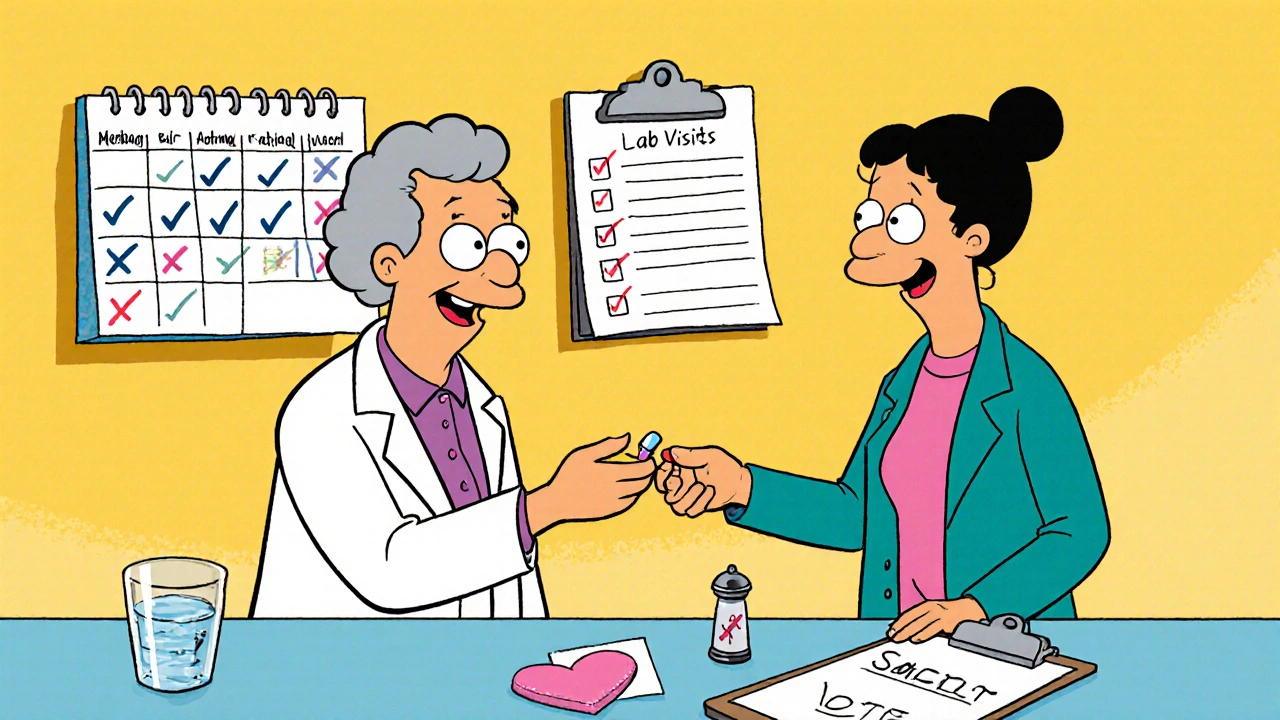Ramipril Potassium Risk Checker
Assess Your Potassium Risk
Use this tool to evaluate your risk of hyperkalemia while taking Ramipril. Based on guidelines from the article, we'll analyze your kidney function, medications, and lab values to provide personalized recommendations.
Older adults often face multiple cardiovascular challenges, from high blood pressure to heart failure. Choosing the right medication can be a balancing act between effectiveness and safety. This guide walks you through the key benefits of Ramipril for seniors, while flagging the precautions you need to keep an eye on.
Why Ramipril Is Common in Seniors
When treating high blood pressure in seniors, Ramipril is an angiotensin‑converting enzyme (ACE) inhibitor that helps relax blood vessels and lower blood pressure. Its once‑daily dosing and proven track record make it a go‑to option for physicians managing complicated medication regimens.
How Ramipril Works
ACE inhibitors are drugs that block the conversion of angiotensin I to angiotensin II, a powerful vasoconstrictor. By reducing angiotensin II levels, the medication lowers systemic vascular resistance, easing the heart’s workload and helping kidneys filter blood more efficiently.
Major Benefits for Elderly Patients
- Effective control of Hypertension (persistently high arterial pressure, a major risk factor for stroke and heart disease), which is especially prevalent after age 65.
- Improved outcomes in Heart Failure (a condition where the heart cannot pump enough blood to meet the body’s needs), reducing hospital readmissions.
- Slower progression of chronic kidney disease by lowering intraglomerular pressure, protecting Kidney Function (the kidneys’ ability to filter waste and balance fluids and electrolytes).
Potential Risks and Precautions
While benefits are clear, seniors are more vulnerable to certain side effects. The most concerning are:
- Hyperkalemia (elevated potassium levels that can cause cardiac arrhythmias), especially in patients with reduced kidney function.
- Dry cough, which can affect quality of life and adherence.
- Occasional dizziness or hypotension after the first few doses.
Because the elderly often take multiple medications, drug‑drug interactions deserve special attention.

Dosage Considerations & Monitoring
Start low, go slow. Guidelines suggest an initial dose of 1.25mg to 2.5mg once daily for patients over 75, with careful titration based on blood pressure response and lab values.
Key monitoring parameters:
- Blood pressure: aim for < 130/80mmHg, unless contraindicated.
- Serum creatinine and eGFR: check at baseline, 1‑2 weeks after dose changes, then quarterly.
- Serum potassium: especially if the patient has diabetes or is on potassium‑sparing diuretics.
Drug Interactions to Watch
Common culprits that can amplify risks:
| Drug Class | Interaction Effect | Management Tip |
|---|---|---|
| Potassium‑sparing diuretics (e.g., spironolactone) | Increases risk of hyperkalemia | Monitor K⁺ levels every 2‑4 weeks; consider dose reduction |
| Non‑steroidal anti‑inflammatory drugs (NSAIDs) | May blunt antihypertensive effect and impair kidney function | Use lowest effective NSAID dose; watch creatinine |
| Other ACE inhibitors or ARBs | Stacked ACE inhibition raises hypotension risk | Avoid concurrent use unless specifically indicated |
Practical Tips for Safe Use
- Take the pill at the same time each day, preferably with food to reduce stomach upset.
- Keep a simple medication list; share it with every healthcare provider.
- Report any sudden dizziness, swelling of the face or lips, or a persistent cough.
- Stay hydrated, but avoid excessive salt intake which can counteract the drug’s effect.
- Schedule regular lab work; many pharmacies offer point‑of‑care testing.

When to Talk to Your Doctor
Seek immediate medical advice if you notice:
- Rapid weight gain or swelling in ankles (possible fluid retention).
- Chest pain, palpitations, or fainting episodes.
- Severe cough that disrupts sleep.
- Laboratory values showing potassium >5.5mmol/L or a sharp rise in creatinine.
Key Takeaways
- Ramipril is a proven ACE inhibitor that effectively lowers blood pressure and supports heart and kidney health in seniors.
- Start with a low dose and monitor blood pressure, kidney function, and potassium levels regularly.
- Be vigilant about cough, dizziness, and hyperkalemia, especially when other drugs are involved.
- Regular communication with healthcare providers and a well‑organized medication list are essential for safe therapy.
Frequently Asked Questions
Can Ramipril be used for stroke prevention in older adults?
Yes. By controlling hypertension, Ramipril reduces the risk of both ischemic and hemorrhagic strokes, which are common complications in the elderly.
Is a cough caused by Ramipril dangerous?
The cough is usually harmless but can affect adherence. If it becomes persistent or severe, doctors may switch to an ARB (angiotensin‑II receptor blocker).
How often should kidney function be checked?
Baseline testing is required before starting therapy, then 1‑2 weeks after any dose change, followed by quarterly checks for stable patients.
Can I take Ramipril with a potassium supplement?
Usually not recommended without medical supervision, because the combination can push potassium levels into the dangerous range.
What should I do if I miss a dose?
Take the missed dose as soon as you remember, unless it’s almost time for the next dose. In that case, skip the missed one and resume the regular schedule-don’t double‑dose.


Comments (9)
Miriam Rahel
17 Oct, 2025In accordance with current cardiology guidelines, Ramipril remains a first‑line ACE inhibitor for geriatric hypertension. Its pharmacokinetic profile, notably the extended half‑life, permits once‑daily administration, which simplifies polypharmacy regimens. Nevertheless, clinicians must remain vigilant regarding renal function and serum potassium, particularly in patients over seventy‑five. The evidence base supports its utility, provided dosage titration adheres to the recommended low‑starting‑dose protocol.
Samantha Oldrid
22 Oct, 2025Great, another pill to keep seniors glued to the pharmacy counter.
lisa howard
27 Oct, 2025It is utterly astonishing how a single molecule can dominate a therapeutic conversation for months.
Ramipril, an ACE inhibitor, steps onto the stage with a melodramatic flair, promising to tame the wild blood pressure of octogenarians.
The drug’s mechanism, a graceful blockade of angiotensin‑converting enzyme, appears simple, yet the downstream cascade ignites a cascade of side effects.
One cannot ignore the infamous dry cough that haunts patients like a relentless specter.
Hyperkalemia, that insidious rise in potassium, lurks in the shadows of compromised renal function, ready to trigger arrhythmias.
Dizziness after the initial dose is not merely a footnote; it can send a frail elder sprawling, risking falls.
Yet, the drama does not end there-drug‑drug interactions provide a subplot worthy of a thriller.
Concurrent use of potassium‑sparing diuretics transforms the safety profile into a ticking time bomb.
NSAIDs, those ubiquitous painkillers, blunt the antihypertensive effect and may precipitate acute kidney injury.
The recommended titration-starting at 1.25 mg-reads like a whisper, a delicate suggestion to the prescribing physician.
Monitoring protocols, demanding regular checks of creatinine and eGFR, feel like an endless chorus of lab visits.
Patients are urged to maintain a medication list, a bureaucratic parchment that should travel with them to every appointment.
The cough, though often dismissed as benign, can erode adherence, prompting some clinicians to abandon the drug altogether.
If the cough becomes a nightly torment, the rational step is to consider an ARB, a class with a cleaner respiratory profile.
In sum, Ramipril offers a potent performance, but only when the stage is set with careful preparation, vigilant monitoring, and a willingness to intervene when the drama turns tragic.
Cindy Thomas
1 Nov, 2025While the mechanistic details are compelling, the real‑world adherence challenges often get swept under the rug. The cough, for instance, can turn a well‑intentioned regimen into a nightly ordeal, leading patients to skip doses. Monitoring potassium and renal function is not just a checkbox; it’s a lifeline for many seniors :) Staying proactive with lab work can prevent the dreaded hyperkalemia before it manifests.
Kate Marr
6 Nov, 2025🇺🇸 Proud to see a medication that’s widely used in our healthcare system, helping keep our seniors’ blood pressure in check. 😉 Ramipril’s once‑daily dosing is a win for compliance, especially when you’re juggling multiple prescriptions.
James Falcone
10 Nov, 2025Honestly, the US guidelines make it pretty clear – start low, go slow, and keep an eye on the labs. If you’re already on a potassium‑sparing diuretic, just double‑check that potassium isn’t spiking. It’s simple stuff, but it saves a lot of trouble down the road.
Frank Diaz
15 Nov, 2025The philosophical underpinning of prescribing Ramipril lies in the balance between beneficence and non‑maleficence. One must weigh the promise of reduced cardiovascular events against the existential threat of hyperkalemia. A judicious clinician treats the medication as a tool, not a panacea, and reserves the right to abandon it when the burden outweighs the benefit.
Valerie Vanderghote
20 Nov, 2025Let’s talk about the practical side of this whole Ramipril saga. First, the dosage titration isn’t just a recommendation; it’s a necessity to prevent that dreaded first‑dose hypotension that can send an older adult sprawling. Second, the lab schedule-baseline, then 1‑2 weeks after any change, followed by quarterly checks-is a rhythm that keeps both patient and provider in sync. Third, the medication list isn’t a bureaucratic afterthought; it’s the lifeline that prevents dangerous drug‑drug interactions, especially with NSAIDs and potassium‑sparing agents. Fourth, the cough, while often brushed aside as benign, can erode adherence, prompting some clinicians to abandon the drug altogether. Fifth, if the cough becomes a nightly torment, the rational step is to consider an ARB, a class with a cleaner respiratory profile. Sixth, staying hydrated is good, but over‑hydration can dilute electrolytes, adding another layer of complexity. Seventh, salt restriction isn’t just a fad; it directly supports the antihypertensive effect. Eighth, patient education on recognizing swelling, sudden weight gain, or cardiac symptoms can be the difference between a routine visit and an emergency. Lastly, always keep an open line of communication with the healthcare team – the more eyes on the data, the safer the therapy.
Michael Dalrymple
25 Nov, 2025For those managing seniors on Ramipril, a structured approach can make all the difference. Begin with a low starting dose, monitor blood pressure, serum creatinine, and potassium closely, and adjust gradually. Encourage patients to keep a concise medication list and share it with every provider they see. Emphasize the importance of reporting any new cough, dizziness, or swelling immediately. Regular follow‑up appointments paired with point‑of‑care lab testing can streamline monitoring and improve outcomes. By combining vigilant oversight with patient education, clinicians can harness the benefits of Ramipril while minimizing its risks.